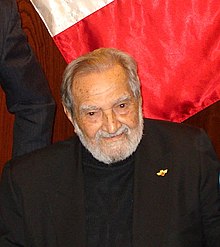Armando Villanueva
| Armando Villanueva Del Campo | |
|---|---|
 |
|
| Prime Minister of Peru | |
|
In office 17 May 1988 – 15 May 1989 |
|
| President | Alan García |
| Preceded by | Guillermo Larco Cox |
| Succeeded by | Luis Alberto Sánchez |
| Minister of the Presidency | |
|
In office 13 May 1988 – 15 May 1989 |
|
| President | Alan García |
| Preceded by | Guillermo Larco Cox |
| Succeeded by | Luis Alberto Sánchez |
| Minister of the Interior | |
|
In office 2 March 1989 – 15 May 1989 |
|
| President | Alan García |
| Preceded by | Juan Soria Díaz |
| Succeeded by | Agustín Mantilla |
| Member of the Senate | |
|
In office 26 July 1985 – 5 April 1992 |
|
| President of the Senate | |
|
In office 26 July 1987 – 26 July 1988 |
|
| Preceded by | Luis Alberto Sánchez |
| Succeeded by | Ramiro Prialé |
| Chairman of the Senate Committee on Foreign Relations | |
|
In office 26 July 1986 – 26 July 1987 |
|
| Preceded by | Luis Alberto Sánchez |
| Succeeded by | Ramiro Prialé |
| Member of the Chamber of Deputies | |
|
In office 28 July 1963 – 3 October 1968 |
|
| Constituency | Lima |
| Speaker of the Chamber of Deputies | |
|
In office 28 July 1967 – 28 July 1968 |
|
| Preceded by | Antonio Monsalve Morante |
| Succeeded by | Andrés Townsend |
| Personal details | |
| Born |
25 November 1915 Lima, Peru |
| Died | 14 April 2013 (aged 97) Lima, Peru |
| Political party | Peruvian Aprista Party |
| Spouse(s) | Lucy Villanueva |
| Residence | Santiago de Surco District, Lima, Peru |
| Religion | Roman Catholic |
Armando Villanueva Del Campo (25 November 1915 – 14 April 2013) was the leader of the Peruvian American Popular Revolutionary Alliance. Born in Lima, his parents were Pedro Villanueva Urquijo, a gynecologist in the city, and Carmen Rosa Portal del Campo. His only legitimate sibling was his older brother Ing. Pedro Villanueva del Campo Portal.
At the age of 15 Villanueva became a member of APRA's Juventud Aprista Peruana in opposition to the military dictatorship of Luis Miguel Sánchez Cerro. At the age of 18 he was imprisoned in El Frontón prison (located on the small island of San Lorenzo off the coast of Callao, Lima's main port) for his subversive activities in Peru. He was a political ally and personal friend of Víctor Raúl Haya de la Torre, the founder and most prominent leader of the APRA party.
Villanueva spent most of his early life in different prisons for his political activities. In 1940, along with other APRA political activists, Villanueva was exiled to Chile. Between the 1940s and 1960s Villanueva spent his time in between Peruvian prisons and deportations to Chile and Argentina. While living in Santiago he met and married Lucia Ortega. They had a daughter: Lucia del Pilar Villanueva Ortega.
In late 1961, before a general amnesty was granted to members of APRA, Villanueva entered Peru clandestinely. He needed to start organizing the multiple party cells in preparation for their return to full political activities. Afraid that he would be caught, he sought refuge at his cousin's house in San Isidro. Ana Maria Villanueva de Riva-Vercellotti was married to an Italian, and Armando was convinced that Peru's secret police would never find him there. He was able to stay there, unperturbed, till full amnesty was granted.
From 1963 to 1968 Villanueva served as a deputy in the lower house of the Peruvian legislature representing Lima, serving as president of the House of Deputies from 1966 to 1967. Villanueva led the Aprista opposition to the military government of Juan Velasco.
...
Wikipedia
